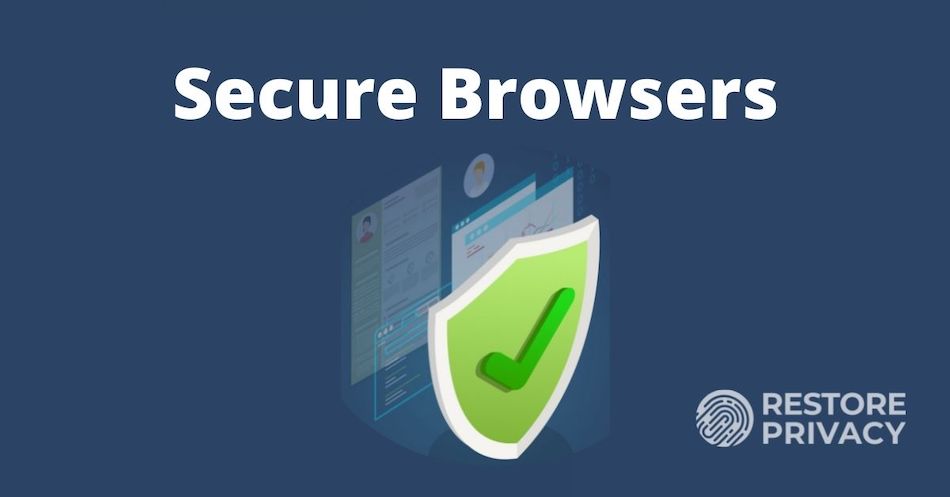
A secure browser that protects your privacy is a critical tool for staying safe online and keeping your data secure from third parties. We have been reviewing, testing, and ranking browsers for the past six years and this guide contains the latest recommendations for 2024.
Do you want a secure browser that truly keeps your data private? Well, you may be surprised by how much of your data is actually getting exposed.
WARNING: Many browsers today are actually data collection tools for advertising companies. This is the case for Google Chrome, the largest and most popular browser. By collecting data through your browser, these companies can make money through their advertising partners with targeted ads. We see this same privacy-abusing business model with search engines, email services, and even free mobile apps.
Unless properly configured, most browsers contain lots of private information that can be exploited – or simply collected – by various third parties:
- Browsing history: all the websites you visit
- Login credentials: usernames and passwords
- Cookies and trackers: these are placed on your browser by the sites you visit
- Autofill information: names, addresses, phone numbers, etc.
And as we will explain further below, using “private” or “incognito” browsing will not protect you. Your IP address will remain exposed and various third parties can still track all of your activities. And even legal action may not protect you. Here is a recent headline related to a lawsuit against Google for capturing data from users who are in Incognito mode. This case has been going on for years now and isn’t close to resolution yet.

And even with a locked-down and hardened browser, exploits may still be found that expose your data and possibly your identity. For example, in 2021 there was a spate of zero-day exploits in Google Chrome with various effects up to allowing hackers to remotely execute code on affected systems. We discuss some other privacy issues (and solutions) in our guides on browser fingerprinting and also WebRTC leaks.
But don’t panic. Effective solutions and tools exist to deal with these problems and we cover them in detail in this article. In this browser security and privacy guide, we’re going to explain the following topics:
- Best secure browsers that respect your privacy
- Problems with other browsers
- Browser privacy compartmentalization
- Secure browser add-ons
- “Private browsing” mode is NOT very private (and why you need a VPN in addition to a secure browser)
Incognito / Private browsing mode still leaves you EXPOSED
When using “private” or “incognito” browsing mode in your browser, your real IP address and location are still being revealed to every website, ad, and tracker that loads in your browser. Additionally, all your activities remain visible to your internet service provider (ISP). And at least here in the United States, ISPs log everything you do online and share the data with many other parties. This is why it’s critical to use a good VPN for basic digital privacy.
The best way to achieve true privacy while hiding your real IP address and online activities is to use a secure browser together with a good VPN. This protects you at both ends of the line, and in the middle too.
The secure browser will protect you as described in this article, while the VPN will protect your identity by hiding your real IP address and location. The VPN will also encrypt your traffic so your ISP (and any other snoops out there) cannot see your activities online. Here are our top three recommendations from the best VPN list that we have tested and reviewed:
- NordVPN: A fast, secure, audited VPN with advanced privacy features, built-in ad blocker, and a strict no-logs policy, based in Panama (see the 74% off coupon).
- Surfshark VPN: A no-logs VPN service with a large lineup of privacy and security features, based in The Netherlands.
- ExpressVPN – This is a secure and reliable VPN that boasts some great privacy features and also works well for streaming. It is based in the British Virgin Islands.
Now let’s examine the most secure browsers you can combine with a VPN for maximum privacy.
Secure browsers that protect your privacy
In this section we will examine the best browsers based on two main factors:
- Security: How well does the browser protect you from hackers, vulnerabilities, and online exploits?
- Privacy: How much data is the browser itself collecting about you and who is this data being shared with? How does the browser protect your privacy?
Conflicting opinions! Just like with Tor, opinions about browser privacy and security can be wildly divergent and contentious.
This guide is not meant to sell everyone on one browser that beats all others. Rather, it is a summary of information about different web browsers that do well with both privacy and security. Choose the best browser for you based on your own unique needs and threat model.
Here are the most secure and private browsers for 2024:
1. Brave: The most secure and private browser (for both desktop and mobile)

Brave is arguably the most secure browser with simple, out-of-the-box privacy. It is a Chromium-based browser that is fast, secure, and privacy-focused by default. It has a built-in ad blocker and browser fingerprinting protection, while also giving you access to numerous add-ons and extensions. The main developer behind Brave is Brandon Eich, who formerly worked for Mozilla.
To summarize this browser, Brave is based on open-source Chromium, but configured for more privacy. It does well with its default privacy settings and extra features. Here is a brief overview:
- Blocks ads and trackers by default
- Protects against browser fingerprinting and even offers fingerprint randomization
- Built-in script blocker
- Blocks all third-party storage
- Easy access to the Tor network
One of the reasons we like Brave is because it offers simple, out-of-the-box privacy by default. This makes it ideal for those who do not have the time, patience, or know-how for browser customizations and tinkering. Brave can also be used with Chrome extensions, making it an ideal alternative for Chrome. Just download it and you’re good to go.
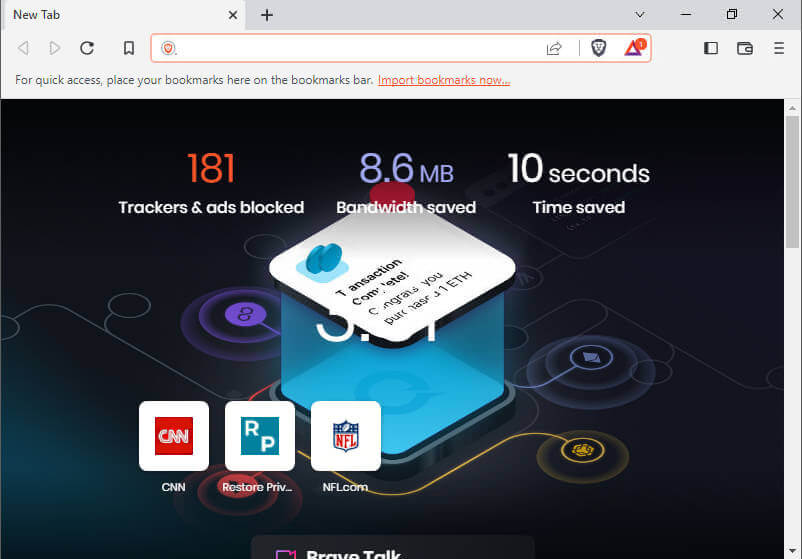
Tor network – Brave also has a feature that allows you to access the Dark web by simply opening a new window with Tor. We discuss this feature in our guide on how to access the Dark web safely.
Ads – Brave has received some criticism for its ads program, which allows users to “view non-invasive ads without compromising your privacy.” While some people find it hypocritical that a privacy-focused browser has its own ad program, we also see it as a secure funding source. And with many browsers financially struggling, it appears that Brave’s business model is securing this browser’s future and ability to continue to innovate its products.
Here are some more results of Brave’s continuing innovation:
- Brave has developed a private search engine called Brave Search, which is now the default search engine when you do a new installation of the Brave browser. In March of 2023, they added the AI-powered Summarizer to Brave Search.
- A cookie consent blocker, which at least partly frees you from the endless hassle of accepting or rejecting cookies at new sites you visit.
- Brave News, an RSS news reader.
- Brave Wallet, a built-in cryptocurrency wallet.
You can read more about Brave’s privacy features here.
https://brave.com
2. Firefox (when modified and tweaked for privacy)

Firefox is a great all-around browser for privacy and security. It offers strong privacy protection features, many customization options, excellent security, and regular updates with an active development team. The newest versions of Firefox are fast and lightweight with many privacy customization options.
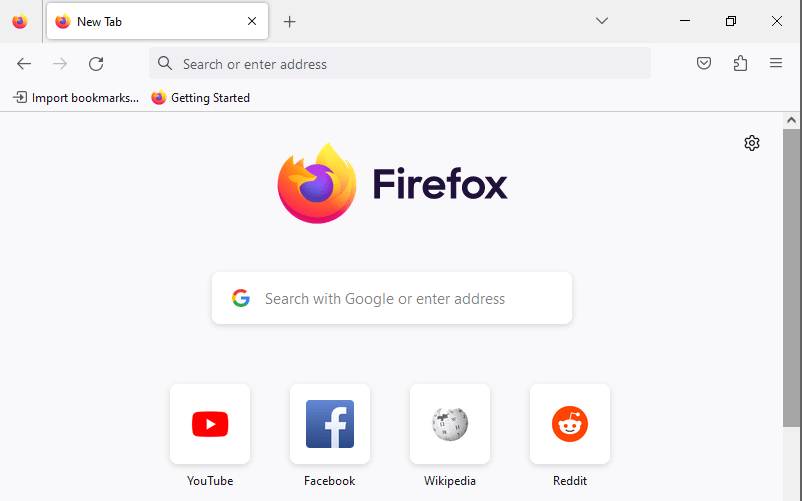
Out of the box, Firefox is not the best for privacy, but it can be customized and hardened, and we show you exactly how in our Firefox privacy modifications guide. Be sure to disable telemetry in Firefox, which is a feature that will collect “technical and interaction data” and also “install and run studies” within your browser.
Within the Privacy & Security settings area, there are many useful customization options for different levels of privacy: Standard, Strict, or Custom.
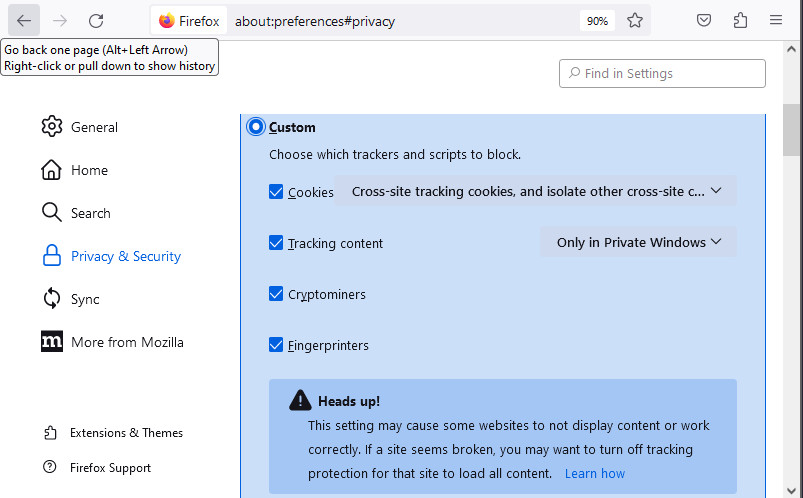
Another great benefit of Firefox is the ability to use numerous browser extensions that can enhance your privacy and security. We’ll go over some of these extensions later in this article.
Firefox highlights:
- Open source code that has been independently audited
- Active development with frequent updates
- Excellent privacy features and customization options
- Total Cookie Protection (TCP) to prevent cookies from tracking you as you move around the web
- Firefox View to easily return to recently used sites
- Built-in ad blocker
- Many browser extensions supported
- Telemetry and tracking need to be manually disabled
- Other modifications necessary for extra privacy and security
If you want to keep using older add-ons that are no longer supported by the latest Firefox release, you can go with the Firefox Extended Support Release (ESR). For those times when you want the maximum privacy viewing content on your Android phone, you could try Firefox Focus.
For additional customization and privacy settings, check out our Firefox privacy guide.
https://www.mozilla.org/firefox
3. Tor browser

Next up we have the Tor browser. The Tor browser is a hardened version of Firefox that is configured to run on the Tor network. By default, the Tor Browser is a secure browser that protects you against browser fingerprinting, but it also has some disadvantages.
Because it uses the Tor network, which routes traffic over three different hops, download speeds with the Tor browser can be quite slow. The default version may also break some sites due to script blocking. Finally, there are drawbacks to the Tor network itself. These include:
- Malicious/dangerous exit nodes
- High latency
- Many websites block IP addresses originating from the Tor network
- Dependence on US government financing, leading some to claim the Tor network to be fundamentally compromised
See the pros and cons of Tor here.
Another option is to use the Tor browser with the Tor network disabled. In this sense, the Tor browser will work like the other secure and private browsers we’ve covered above. Additionally, you can simply run a VPN in the background. Like the Tor network, a VPN will also encrypt your traffic and hide your IP, but it will be much faster.
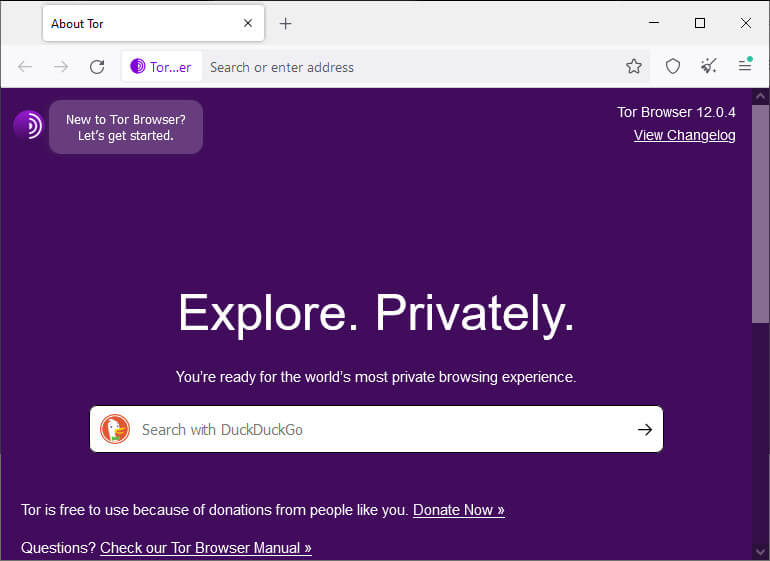
There’s a new browser out there that takes exactly this approach. It is a collaboration between Mullvad and the Tor project, and you can learn more about it in spot #6 on this list.
Be careful when adjusting the settings for the Tor browser, however, as this may compromise the browser’s built-in privacy and security features.
https://www.torproject.org/
4. Ungoogled Chromium browser

Ungoogled Chromium is an open source project to provide a Chromium browser, without the Google privacy issues:
ungoogled-chromium is Google Chromium, sans dependency on Google web services. It also features some tweaks to enhance privacy, control, and transparency (almost all of which require manual activation or enabling).
ungoogled-chromium retains the default Chromium experience as closely as possible. Unlike other Chromium forks that have their own visions of a web browser, ungoogled-chromium is essentially a drop-in replacement for Chromium.
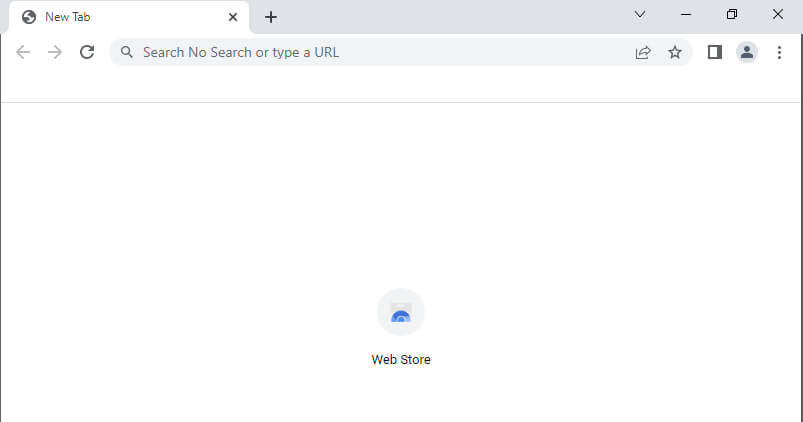
UPDATE: Support for Ungoogled-Chromium has continued, but it has moved from its original github archive to the new archive linked below. It does require some technical skills to download this browser from the archives.
https://github.com/ungoogled-software/ungoogled-chromium
5. LibreWolf – A private and secure fork of Firefox

LibreWolf is a fork of Firefox that continues to grow in popularity. The project’s stated goals are to deliver a browser that is focused on privacy, security, and freedom. From the LibreWolf website:
LibreWolf is designed to increase protection against tracking and fingerprinting techniques, while also including a few security improvements. This is achieved through our privacy and security oriented settings and patches. LibreWolf also aims to remove all the telemetry, data collection and annoyances, as well as disabling anti-freedom features like DRM.
The website lists the main features of LibreWolf as:
- No Telemetry
- Private Search
- uBlock Origin pre-installed
- Enhanced Privacy
- Fast Updates
- Open Source code
LibreWolf is available for desktop operating systems, including Windows, Mac OS, Linux, and Open BSD. You can find installation instructions here.
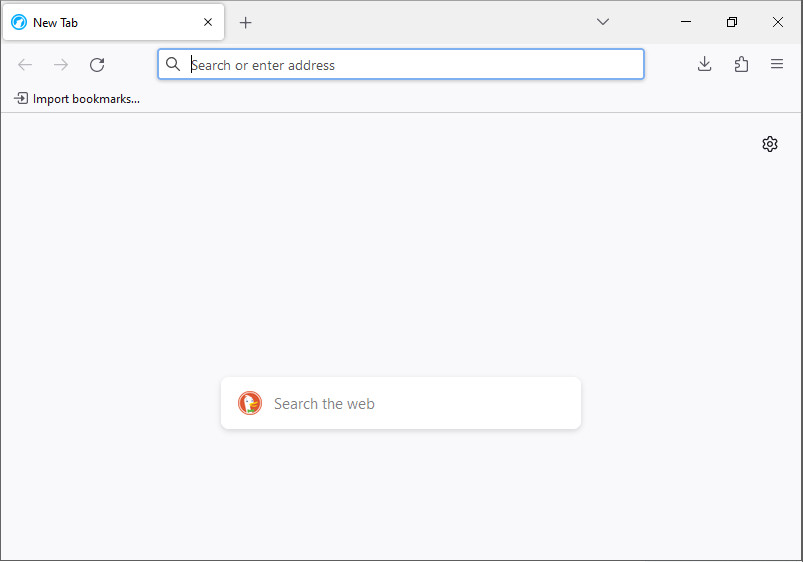
One issue to keep in mind, however, is that there are no automatic updates. This means that you will need to manually update the browser, which is certainly a drawback to consider. Fortunately, LibreWolf frequently pushes these browser updates to the relevant archive managers, making it easier to update than it would otherwise be.
LibreWolf is always based on the latest version of Firefox. Updates usually come within three days from each upstream stable release, at times even the same day. Unless problems arise, we always try to release often and in a timely manner.
– LibreWolf FAQ section
This is definitely a browser to consider for those wanting more privacy and security on desktop operating systems.
https://librewolf.net/
6. Mullvad Browser – A privacy collaboration between Mullvad and Tor

When we talked about the Tor browser earlier in this article, we suggested using the Tor browser with the Tor network disabled and a quality VPN might be a better way to go than using the Tor network. We’re not the only people who feel this way. The Mullvad Browser is designed to do exactly this.
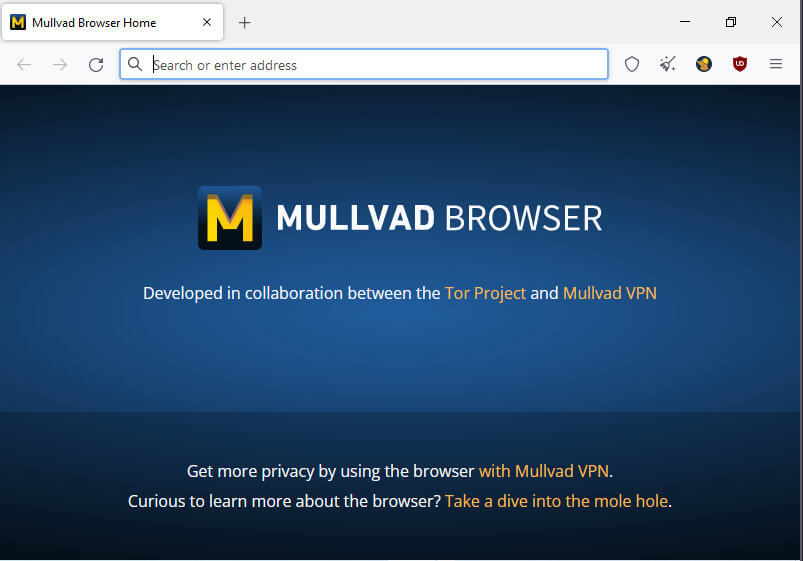
This privacy-focused web browser is a joint project between Mullvad VPN and the Tor Project. It incorporates the privacy benefits of the Tor browser such as tracker blocking and fingerprinting. But the Mullvad Browser isn’t designed to connect to the Tor network.
Instead of going through the Tor network, the Mullvad Browser is meant to be connected to the internet through a quality VPN. Obviously, the folks at Mullvad would love for you to use their browser with their VPN, but you don’t have to. In the image below I am using the Mullvad Browser to view this website through NordVPN.
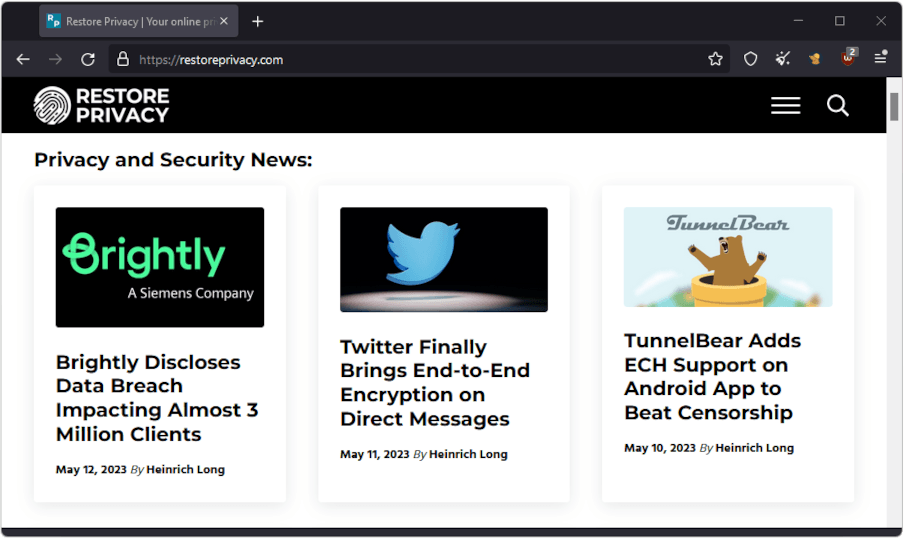
This browser collaboration definitely has potential. To learn more about it, check out our recent article on this Mullvad – Tor project.
https://mullvad.net/en/browser
7. DuckDuckGo private browser (macOS, iOS, and Android)

The DuckDuckGo private browser is available for macOS as well as mobile devices running iOS or Android. It comes with lots of privacy-focused features by default. According to DuckDuckGo, their browser offers:
- Built-in tracking protection
- Encryption upgrades via Smarter Encryption technology
- Easy data management and clearing options
- Fast speeds
Issues with Microsoft trackers
One important thing to be aware of is that security researchers previously discovered that DuckDuckGo’s browser allowed Microsoft trackers. According to DuckDuckGo founder Gabriel Weinberg, this decision was based on a “confidential” agreement between DuckDuckGo and Microsoft.
Many people in the privacy community were outraged when the situation first came to light on Twitter here. There was clearly an element of hypocrisy going on here as we see DuckDuckGo castigate Google over the same practices. But last year, DuckDuckGo announced that they had reached an agreement to block Microsoft trackers.
Should you use DuckDuckGo’s privacy browser? I’d recommend that you consider some of the alternatives we recommend in this guide. That said, the changes DuckDuckGo has made to block the Microsoft trackers makes us much more comfortable with this browser. Ultimately, the choice is yours.
The DuckDuckGo private browser is available on both the Google Play and Apple stores.
8. Waterfox
Waterfox is a fork of Firefox that was maintained by just one person for many years. In February 2020, news broke that the developer of Waterfox sold out to a pay-per-click ad company called System1. However, in July 2023, news broke that Waterfox is once again independent:
I am happy to say that Waterfox is independent again. This change allows the community and myself to shape the browser’s future direction.
Waterfox Blog
Putting all that aside, Waterfox is a great option for those wanting Firefox with out-of-the-box privacy.
Waterfox website >>
Private browsers worth mentioning (but not necessarily recommended)
Here are a few private and secure browsers that didn’t make our recommended list but we think are still worth mentioning.
9. Bromite (Android)
Bromite is a Chromium-based browser for Android only (no desktop support). It comes with some great features by default, including ad blocking and various privacy enhancements.
Unfortunately, being a small project, Bromite suffers from infrequent updates. The last update was apparently in 2020!
Here are some highlights of this browser from the official Bromite website:
- The main goal is to provide a no-clutter browsing experience without privacy-invasive features and with the addition of a fast ad-blocking engine.
- Minimal UI changes are applied to help curbing the idea of “browser as an advertisement platform”.
- All patches are published under GNU/GPL v3 to enable other open source projects’ usage.
- Bromite is only available for Android Lollipop (v5.0, API level 21) and above.
Another cool feature I like with Bromite is that you can use custom ad block filters — learn more here. Bromite is under active development and remains a great browser for Android users.
https://www.bromite.org/
10. Pale Moon
Pale Moon is another open-source fork of Firefox, which aims for efficiency and customization. In testing out Pale Moon, it does offer different customization options, as well as support for older Firefox add-ons and its own lineup of add-ons. The design feels a bit dated, but it’s also not overly-cluttered and is lightweight and fast. Even more importantly, this secure browser is still being updated
Pale Moon is currently available on Windows and Linux, with other operating systems in development. Unlike other Firefox forks, Pale Moon runs on its own browser engine, Goanna, which is a fork of Gecko (used by Firefox). This is an older engine that was previously used by Firefox, but has long since been replaced. Many argue that this older codebase is a security vulnerability. And it’s also worth noting that the development team is very small compared to more popular browsers.
Pale Moon website >>
11. GNU IceCat
GNU IceCat is a fork of Firefox from the GNU free software project. IceCat is entirely “free software” as defined here and also includes various privacy add-ons and tweaks by default. Here are the privacy-protection features listed on the IceCat page:
- LibreJS
- HTTPS-Everywhere
- SpyBlock
- AboutIceCat
- Fingerprinting countermeasures
No updates – The big issue with GNU IceCat is that there do not appear to have been any updates since 2019. This can expose IceCat users to security vulnerabilities, which is why we are no longer recommending it.
GNU IceCat website >>
12. Iridium
Like Brave, Iridium is a secure browser that is based on Chromium and configured for more privacy by default. The following excerpt from Iridium’s website provides a good overview of this secure browser:
Iridium Browser is based on the Chromium code base. All modifications enhance the privacy of the user and make sure that the latest and best secure technologies are used. Automatic transmission of partial queries, keywords and metrics to central services is prevented and only occurs with the approval of the user. In addition, all our builds are reproducible and modifications are auditable, setting the project ahead of other secure browser providers.
Iridium is still being updated pretty frequently. However, it is not a widely-used browser, and there is no support for Android, iOS, or any other mobile devices.
Iridium browser website >>
Issues with other popular browsers
While some browsers claim to be secure against vulnerabilities, they might not be the best choice from a privacy perspective.
1. Google Chrome
Google Chrome is by far the most popular browser. Unfortunately, it’s a data collection tool as well and not a good choice for anyone looking for privacy.
You can safely assume that everything you do through Google Chrome is collected, saved to your data profile, and used for targeted advertising.
2. Microsoft Internet Explorer/Edge
Edge is a Microsoft product.
Just like with Windows, it’s a good idea to avoid Microsoft products, including the discontinued Internet Explorer and its replacement, called Edge. Both those browsers are closed-source, so there’s no telling what’s going on behind the scenes, and they’re also not the best for privacy reasons.
3. Opera browser
Opera started off as a decent browser, developed in Norway. However, in 2016 it was sold to a Chinese consortium for $600 million – and a lot has changed. The following information from Opera’s privacy policy explained how user data was collected and shared when you used Opera products. This was enough to turn us off to this browser:
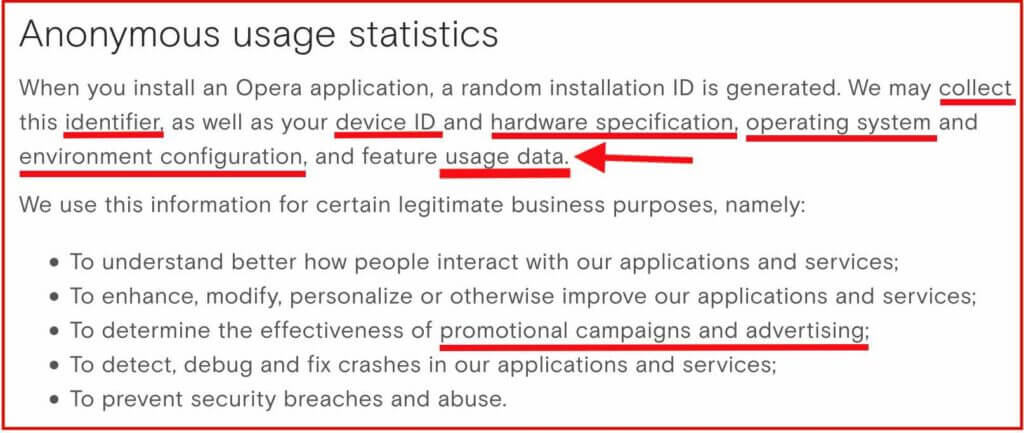
Opera also claims to offer a free VPN through the browser. However, as we covered in the Opera VPN review, it’s not really a VPN and does not offer full system-wide encryption. Additionally, your data is being collected when you use Opera browser and its “free VPN” feature.
4. Epic browser
Epic is a browser based on Chromium, created by “Hidden Reflex” which is based in India. Since 2014, Epic has been claiming they would open source the code, but it remains closed source today. What’s going on behind the scenes? How do they manage Chromium and remove invasive code? Who knows.
Just like with Opera VPN, Epic falsely claims to offer a “free VPN” through the browser, but this is not really true. The browser is merely routing traffic through a US proxy server. As we learned with Opera (and with many other “free proxy” services), proxies are often used for data collection (and they are often not secure). When reading the Epic privacy policy, we find that data from “video download and proxy services” is being collected.
One person who analyzed Epic found it to be connecting to Google on startup. This suggests that Epic is not, in fact, de-googled as it claims.
There are many better Chromium-based browsers to consider.
5. Safari browser
Safari is the default browser for macOS and iOS devices. Overall, Safari is not a horrible choice in terms of privacy and tracking protection – but it also cannot be recommended for a few reasons:
- Apple is a partner in the PRISM surveillance program
- Apple was caught “hoarding” Safari browsing history – even after it was deleted
- Apple was found to be collecting Safari history even when used in private mode
On a positive note, however, Apple does somewhat better with privacy than other large companies. The Safari browser blocks third-party cookies by default and also implements cross-site tracking protection.
6. Vivaldi browser
Vivaldi is a Chromium-based browser with source-code modifications that can be seen here. It is less popular than other browsers, with less active development than Firefox, for example.
Reading through their Privacy Policy, I did find some concerning information about data collection and the use of unique IDs:
When you install Vivaldi browser (“Vivaldi”), each installation profile is assigned a unique user ID that is stored on your computer. Vivaldi will send a message using HTTPS directly to our servers located in Iceland every 24 hours containing this ID, version, cpu architecture, screen resolution and time since last message. We anonymize the IP address of Vivaldi users by removing the last octet of the IP address from your Vivaldi client then we store the resolved approximate location after using a local geoip lookup. The purpose of this collection is to determine the total number of active users and their geographical distribution.
You can read more about Vivaldi here.
Secure and private browsers on mobile devices
Many of the recommended browsers above also offer versions for mobile users on iOS and Android.
With that being said, here are some good options for mobile users:
- Brave
- Bromite
- Firefox Focus
- DuckDuckGo
I also like using standard Firefox on mobile devices with customization and configurations for more privacy.
Browser privacy and compartmentalization
One problem that often comes with browser privacy and security is that people want to remain logged in to various accounts, while also browsing the web. But this is problematic. When you stay logged in to Gmail or Facebook, for example, their trackers can record your activity as you browse the web.
One potential solution to this problem is browser compartmentalization. This is when you use different web browsers for different online activities. For example:
- Browser #1 will only be used for accessing your online accounts that require a password. You can stay logged in with only this browser, and it won’t be used for general browsing.
- Browser #2 will only be used for web browsing, with various privacy configurations and no cookies or history being stored on the browser.
- Browser #3 could be completely locked down for maximum privacy and security.
You can also utilize different browsers, configured exactly the way you want, for various purposes, depending on your needs and threat model. The key is to keep the compartmentalization strict and not break the rules/uses for each browser.
Virtual machines – On the topic of compartmentalization, using virtual machines is also a good idea for both privacy and security. You can easily run Linux VMs through VirtualBox (FOSS) on your host computer.
Password managers – It should also be noted that storing your passwords in the browser may be risky depending on the browser you are using, especially since browsers may store passwords in cleartext. A better alternative would be to utilize a secure password manager. We have reviewed many popular options, including Bitwarden, Dashlane, LastPass, and more.
Browser add-ons for security and privacy
In addition to adjusting the settings within your browser, there are also a number of different add-ons or extensions you can install to improve your browser’s privacy and security.
Here are a few different options, but they may not all be supported by the browser you are using:
- uBlock Origin – This is one of the best browser-based ad blockers available that will also protect you against tracking.
- Cookie Autodelete – This will automatically delete cookies that are no longer needed from your browser.
- NoScript – NoScript allows you to customize exactly which scripts run on the websites you visit. Like uMatrix, this is for advanced users and requires lots of customization.
Warning: Be cautious about using third-party add-ons and browser extensions. There are many Chrome VPN extensions that are 100% free, but also very dangerous. Do your research first, since add-ons and extensions could function as spyware and data collection tools for third parties. This is especially true with free VPN services or browser proxy add-ons from questionable sources.
“Private” or “Incognito” browsing mode is NOT private (and why you need a VPN)
Many people falsely assume that using “private” or “incognito” mode in a browser actually provides some privacy. This is a false assumption.
Using “private” browsing mode only stops your browser from storing cookies, history, and passwords. But it doesn’t actually make you any more “private” to the outside world. Even when browsing in “private” or “incognito” mode, you are still exposed:
- Your internet provider can still see every site you visit. And note that internet providers are now forced to log web browsing activity of their customers and provide this data to authorities on request in many countries. In the United States, ISPs log everything and share the data with a huge network of third parties.
- Your real IP address and location remain exposed to all sites, ads, and trackers. This makes tracking and identification easy since your device has a unique IP address linked back to your identity through your internet service provider.
To easily solve these problems, we strongly recommend using a good VPN service. Using a VPN is simple. You just need to sign up for a VPN subscription, download the VPN app for your device, then connect to a VPN server and browse the web as normal. This offers many benefits:
- A VPN will securely encrypt your internet traffic, which prevents your ISP from seeing what you do online. (Your ISP will only see encrypted data, but not what you’re actually up to.)
- When you connect to a VPN server, the VPN server’s IP address and location will replace your real IP address and location. This allows you to appear to be anywhere in the world.
- A VPN will also allow you to access geo-restricted content, such as streaming Netflix with a VPN from anywhere in the world.

Below is a brief overview of our recommended VPNs. They have each come out on top in our testing for the respective VPN reviews.
- NordVPN: A fast, secure, audited VPN with advanced privacy features and a strict no-logs policy, based in Panama (with a 74% off coupon). See our NordVPN review here.
- Surfshark VPN: A no-logs VPN service with a large lineup of privacy and security features, based in The Netherlands. See the Surfshark VPN review.
- ExpressVPN – A fast, reliable, and secure VPN that also works well for streaming, but with above-average prices. See the ExpressVPN review for the pros and cons.
Short on money? There are also some good cheap VPNs that offer excellent features and performance, without breaking the bank. We also have detailed VPN comparisons. Our ExpressVPN vs NordVPN guide compares the top two providers.
Conclusion: Secure browsers and privacy in 2024
A well-configured secure browser is crucial for protecting your data if you want to browse the web with kind of privacy. But there are several good, secure browsers to choose from. So how do you do it?
Finding the best secure browser for you comes down to identifying the one that best fits your unique needs. Since this is a personal decision with subjective criteria, we can’t recommend a single option that is best for all use cases.
In truth, you need more than a secure browser that is configured to protect your privacy. To that browser you should add a quality VPN that will encrypt your traffic and hide your IP address.
You should also consider using a good ad blocker. Many ads include tracking code that companies can use to collect your browsing data and serve you targeted ads. If you aren’t blocking ads, your activities can be tracked by third-party advertising networks, which is not at all ideal.
Note: There are some VPNs that have built-in features to block ads and trackers. See our guide on VPN ad blocking for more info.
In terms of privacy, you may also want to protect yourself against browser or device fingerprinting and WebRTC browser leaks, which can expose your identity even when using a good VPN service.
This secure browser guide was last updated on May 15, 2024.

I sincerely do not understand why only mediocre browsers are listed here. I use both palemoon and brave and other browsers, disabling their functionality as much as possible and applying strict settings, these browsers have a place to be under certain circumstances. but why doesn’t this site talk about a really good browser [https://www.stoutner.com/privacy-browser-android/] ? this browser is also available for PC, on the same site. just try visiting browser test sites and compare the browser on the link with any browser you are using. 😉 Everything immediately becomes obvious. and as the developer correctly reports: it’s really better not to set up a bad browser, but it’s better to immediately take and use a browser that collects and uses a minimum of information from the device.
Dear dev
Privacy browser is one of my favorite.
It’s really honest, trustworthy and thoughtful project.
I’ve tried many times, but unfortunately can’t stay with.
With default setting – Java, cookie blocked, practically it is unusable to browse throughout the net.
If I enable them, there is loss of privacy totally, as this is based on web view, you know better the cons.
Many sites even don’t recognize it as a browser and don’t open the site (they look for standard full flagged browser based on chromium or gecko, not web view).
Content blocking not enough one, just check with https://d3ward.github.io/toolz/adblock.html
And no option to add filter list.
I’m eagerly waiting for ‘privacy browser web view’ in 4x versions, as mentioned in the roadmap of the project site long, long time before.
With this and improved content blocking, I like to see the privacy level with enabled java and cookie (1st party).
Webgl, webrtc, canvas fingerprint, timezone override, many things have to be addressed like Cromite (Bromite fork), Brave, Mull (FF fork) did.
I’m very, very optimistic about the future of this respectable browser.
Regards 🙏
What browser are you talking about? I don’t see a browser called ‘Privacy.’
@vanp this is the browser’s website.
https://www.stoutner.com/privacy-browser-android/
Yes, the name is confusing for search engines.
Here the F-droid link https://f-droid.org/packages/com.stoutner.privacybrowser.standard/
Brave everywhere and I tried one week on my I-phone and I am back to Ghostery Dawn which I like it more.
And on my BSD I am using Firefox and Qutebrowser. I like Luakit too.
I have been testing both Brave Browser and Ghostery Dawn Browser and found them bland & just OK. Just got the latest Ghostery Browser update and now both Brave and Ghostery take forever to load and they really lag. I don’t know if the latest Ghostery update did something or not but, my laptop runs like crap now, I have no add-ons at all. I have noticed before Brave true to Chromium form is a resource hog with 6+ processes running in task manager. What happened to all the good somewhat safe light browser that didn’t suck all the memory from your computer?
I have been using Brave on my laptop and it is good but whats really bad is Brave uses so much memory it is ridiculous. When I open Brave for a Google search there are 9 processes running in Task Manager hogging all the memory. There has to be a better browser on par with Brave that uses way less resources? Any suggestions?
IT’S BACK,
– WITH OFFICIAL FORK RELEASE 👉 https://github.com/uazo/cromite
I wish him luck but the demise of Bromite is more proof of well meaning idealists who make products (like browsers) only to later neglect or leave their project because life somehow gets in the way or their values change.
In light of this, I would be very reluctant to use Cromite.
Hi Everyone,
After closing a google account, and unlinking my phone number from it.
How long does it take for google to allow me to use my phone number again create a new google account?
I closed my account and when I try to sign up for a new one, “it says that my phone number has been used too many times”.
As soon as an user deletes an account google should delete the phone number associated with it and allow the user to be able to create a new account with the same phone number.
Any ideas?
brave offers a vpn but I’ve just discovered that somehow someone locks that option out in developer mode and puts a QA Code on it so that the user can’t access it Who would do that ? I’ve asked Brave and have been waiting for a response for a day or two now .
It looks like not everyone thinks Brave Browser is all that great. I have been using Brave for sometime now testing it and am not impressed at all. There is something odd about it?
[https://spyware.neocities.org/articles/brave]
I would suggest you avoid using browser-based VPN’s as they are typically not very good. In the case of Opera, they mainly collect data. Instead I recommend you use a VPN separate from it such as Mullvad, IVPN, or Proton.
Waterfox is no longer owned by System1 according to the developer’s latest blog post.
Link please.
https://old.reddit.com/r/waterfox/
and Bromite Says its only for marshmallow 6 and above on its Web site not lollipop 5
Looking for a Firefox fork browser alternative to Ghostery Dawn. I’ve been using it for over a year and find it very mediocre browser at best. Is there anything other than LibreWolf out there? Possibly with a light resource footprint and somewhat privacy mineded? Any suggestions would be greatly appreciated.
I suggest Mullvad’s browser. Unfortunately, there aren’t that many Firefox forks to choose from.
https://mullvad.net/en/browser
Here for anyone looking for privacy benchmarks:
https://privacytests.org/
Great tools to check all browser [Most populars atleast]
Here another resource to test your own browser fingerprinting
https://coveryourtracks.eff.org/
Enjoy 😉
Any suggestions on a browser or extension (that actually works) to stop lazy loading?
I’m finding many websites have started to use (extreme) lazy loading to keep you engaged or stay on their site longer while it does all sorts of things in the background. These sites cripple some browsers or extensions if you try to protect yourself. I’m referring to commerce websites including those that sells products.
None of the extensions work any more for Chrome based browsers. Tweaking them or Firefox doesn’t work either. I tried everything, at least from the web. I don’t use ChatGPT, maybe that can find something? I don’t know.
ough, are you sure it’s not to many reciprocal extensions doing a same function on your device or your running to many filters in an ad blocker – say? Next time you find a site as you say (extreme) lazy loading, which I read as slow loading, then try it with everything shut off. To know it’s not your set-up especially if you’ve made any changes or additions. True the web is made for all kinds of devices nowadays, so sites can change just like a browser updating for what real reasons in cause of 3-4 or more times a month. Security patches aside.
I would think if the initial loading of a site is slow as well as each subsequentially loaded page from it is what’s happening, and you can verify by a friend loading up the site faster, or try it naked without your extensions and filters. Your the first to express this concern at least here. You haven’t said ? about privacy in device or browser setting on the OS your running. That might get real help from someone in the RP channel.
Hey go to https://restoreprivacy.com/browser-fingerprinting/#comments
Look for Lilyjones comments of 3 by scrolling down, there about the 5th comment as now before page fills and deemed an older comment getting buried.. It’s a December 29-30, 2022 comment.
I’d ask your questions there and see if Lilyjones answers you. Seems to be Lilyjones is in the ballpark already leaving helpful information in the neighborhood of your answers sought.
Teaser: (from Lilyjones)
But there’s a slight catch. All of your security tools are available in your browser. Once you put it on software, there’s no way to really keep everything safe for you, and this issue happens whenever you’re connected to the Internet, whether it’s a computer or a phone. (For example, if Discord forces users to update without their consent, how can we be sure it isn’t uploading data behind its back or sharing telemetry? Or maybe Spotify is forcing the update, which again doesn’t have the user’s permission, and we don’t know what the software is collecting
But tools that do not use the Internet, which is very convenient, all default disable applications from using the Internet. That’s what I do with all kinds of software.
But in the browser you can filter everything.
Exactly what the author discusses in this article) [beleive But there’s a slight catch. All of your security tools are available in your browser. Once you put it on software, there’s no way to really keep everything safe for you, and this issue happens whenever you’re connected to the Internet, whether it’s a computer or a phone. (For example, if Discord forces users to update without their consent, how can we be sure it isn’t uploading data behind its back or sharing telemetry? Or maybe Spotify is forcing the update, which again doesn’t have the user’s permission, and we don’t know what the software is collecting But tools that do not use the Internet, which is very convenient, all default disable applications from using the Internet. That’s what I do with all kinds of software. But in the browser you can filter everything.
Exactly what the author discusses in this article – their referencing Sven’s ‘Fingerprinting Protection’ article.
@CSV,
I feel your pain, but no. Unless someone creates a script which can be used with Grease/Tampermonkey lazy loading seems to be the norm now. However, on the iPhone you can disable it within Safari, and it works quite well.
And speaking of scripts, it’s been reported Google is testing anti-anti-adblocking scripts now for YouTube.
ICYMI: Apple no longer requires WebKit for browsers in it’s app store.
https://9to5mac.com/2023/02/07/new-iphone-browsers/
Brave browser? With its cryptocurrency-based ads and more? I’m not interested in being misled or having their ads rationalized. No thank you. They can sell subscriptions to earn revenue. But whatever, use whatever browser you want to. It’s really all about feeling good and not much more until another non-chromium based browser is created for Windows.
Did you try LibreWolf, mentioned above ?
LibreWolf is nice and clean, but quite “bloated”. It’s more than 500 MB for their portable version when opened with just a blank web page. Firefox portable works just fine or the full desktop modified version.
Also not a big fan of Brave, there is something that is a little jilted about it. Are there any other browser like LibreWolf that are consider “Lightweight” available in either desktop or portable? If so, which is going to be the best all around performer and if possible could someone provide the d/l links? Thanks
@EO Mullvad released a non-Chrome, Gecko-based browser that might suit your needs. However, did you know the ads and crypto in Brave can be ignored or shut off?
Note on Firefox Android, only nightly has option for “about:config” tweaks.
And I find it’s not stable on Android. FF for Android used to be great, Opera too. Not anymore. Even FF for Windows version has issues. Vivaldi is bloated and slow for me.
It seems the only way these days to ensure your browsing privacy is to use a torr browser and a good VPN. Still, the biggest risk is not browsing but data breaches as many have experienced.
Just use Mull browser (out of the box hardened ff fork with tor project and scripts).
Stable, regular update, add-on, about: config available.
Get from Neo store (F-droid fork with better usability).
I think you’ll not be disappointed 😊
I’m ok with Windows browsers. I have issues with Android browsers. Thanks for the suggestion. If you have a customizable browser for Android that allows all the add-ons the desktop, I’d be interested.
There’s no Android or portable version of Mull.
@Joe Kiwi browser is for Android only, with web store extensions’ compatibility.
Open source, ads can be disabled completely.
Not privacy-oriented by default, but can be hardened with extension like Trace, Script Safe etc.
Customizable speed dial on home screen like Vivaldi.
Use preferred search engine, any you want.
Only problem is slow update.
@EO Mull is only for android.
Iceraven is a fork of Firefox and you can use “about:config” tweaks with this android browser. Also the new Mullvide browser is a great privacy browser. Another browser suggestion is Carbon browser by Carbon X-Lab developers.
Vivaldi Tech CEO Jon von Tetzchner was recently interviewed on Techlore to discuss privacy and security issues along with concerns surrounding the Vivaldi browser. Overall, this exchange was very informative and confirms why I think Vivaldi can be a good browser to protect users from prying eyes online.
https://www.youtube.com/watch?v=TvIKMl1Ldi0
Good info Mike, I love Vivaldi in spit of Sevn degraded it (though I depend on his opinions very much).
I’ve no problem with unique ID considering its jurisdiction and following dev team’s blog posts.
But I’ve only confusion with their philosophy about browser fingerprinting. They are against to block or randomized it. They said, that process increase fingerprint making browser unique, and best way not to change anything, so all will be same like chrome.
In windows, I can use Trace add-on to spoof fingerprint well, but in android not possible, even my phone model is exposed in details.
And in android version, Google services can not be modified (like safe search), also no option to add custom search engine like Metager, Searx etc.
Only defaults like DDG, Startapage have to select as privacy search engine, which are controversial according to Sven.
I’ve raised these issues in Play store review and in Vivaldi telegram group, but without any response.
So I use Vivaldi only in desktop if LibreWolf failed to open any page.
@shr Thank you and glad you liked it. As an aside, my preference for a primary browser is Brave but I use Vivaldi to surf or visit websites I do not log in to as part of my browser compartmentalization.
Though Tetzchner seems to imply during the interview that Vivaldi is primarily geared toward power users, I think it also confirms the browser is also a useful tool for people who are concerned about privacy and security. People who aren’t too keen about browsers like Brave or Firefox can turn to Vivaldi instead.
I’ve been keen about Vivaldi for sometime having read other privacy-friendly websites and even read online chats about it. What really helped me conclude that the browser is worth using is when Vivaldi Tech announced they would not adopt Google’s FLoC technology along with Brave.
https://www.theverge.com/2021/4/16/22387492/google-floc-ad-tech-privacy-browsers-brave-vivaldi-edge-mozilla-chrome-safari
I don’t accept anything as fact if on YT.
It’s is strictly for entertainment purposes (like TikTok and FB) and it’s content whatever it may be should be taken with a grain of salt.
@Skeptic then what sources of information do you trust? Please explain why you trust them.
Has anyone noticed the popular extension called “Grammarly” will always leave cookies (sometimes 7 or more) even though you’re not signed in to Grammarly?
The worst part is you can’t block the cookies within Chrome Settings because Grammarly overrides them, somehow.
Does anyone have any ideas on how to fix this (besides using another browser)?
@Oslo don’t use Grammarly. There are alternatives and Editsaurus or Language Tool are looking like the best open source options.
https://listoffreeware.com/free-open-source-grammarly-alternative-services/
@Mike, I appreciate your input, but Editsauraus hasn’t been accessible since January. It’s also only on GitHub and there is no .zip file that you can get, uncompress, or install. No instructions at all. That’s a big issue for people who aren’t use to Linux or who aren’t programmers.
I don’t understand why some “developers” on GH are considerate and have a download link and (most) others don’t. That’s a major reason why I avoid the site.
@Oslo For me, I really don’t need apps or extensions like Grammarly and what helps is that I read a lot. Consequently, this enables me to avoid grammar errors. It isn’t fool proof, but it does help.
However, the keyboard I use on my mobile device (OpenKeyboard) has a grammar and spelling correction function built in. On my computer keyboard, not so much. None the less, AlternativeTo is a very good website and I am sure will list good substitutes for Grammarly and other programs or apps of interest.
https://alternativeto.net
Alternativeto isn’t helpful unless you want to pay for an extension. As I get older I need all the help I can get especially when it comes to writing 🙂
Apple is a partner of Prism! Is there evidence of this other than the documents published by Snowden?
Seen so many times: [https://neeva.com/blog/may-announcement]
Okay everyone I recently heard about this Stands browser by Stands app company. It’s supposed to be private and secure and was wondering if anyone else knows anything about it also? Thanks
Seems the jurisdiction is Israel.
Study the Privacy policy carefully https://www.standsapp.org/privacy-policy/
For Vivaldi, can this be disabled?
“each installation profile is assigned a unique user ID that is stored on your computer. Vivaldi will send a message using HTTPS directly to our servers located in Iceland every 24 hours”
Don’t think so. It is mentioned by Sven in this article above in Vivaldi’s section as a negative point.
You may put this quarry in the Vivaldi’s forum.
I’ve read in the forum, that they are aware about the negative impressions of this, among users.
We are curious, what they say now.
No!! This setting can Not be changed. As said in ny question on the blog site. So that means you carry it around with you like luggage on a vacation trip. Everywhere!!!
Try Mullvide browser or Carbon browser by Carbon X-Lab developers. One thing about the Carbon browser. Make sure you have your seat belt on cause this browser is fast!!! It laps Brave browser easily and was a quarter of a fender behind the Iceraven browser I use!!
Ungoogled Chromium now works for Debian/Ubuntu again.
https//:dnscheck.tools
Another good service to check your DNS integrity. Here you can check if all of the DNS signatures are OK. In my testing, some popular VPNs with their own DNS services failed.
I’m thinking to use MS Edge as my 2nd browser (after Brave) in Windows.
Basically, for the Chat GPT 4 incorporation.
Any advice on that?
@Nomad in light of the problems with AI, including the potential for them to make it easier to build a profile about you, I would advise against it.
https://www.ericsson.com/en/blog/2022/8/ai-and-privacy-everything-you-need-to-know
Anyone seen this conversation?
https://restoreprivacy.com/mullvad-vpn-partners-with-the-tor-project-to-release-new-browser/#comments
Would you call it promising? I would for anything not of a chromium browser variant.
More:
It’s possible to configure a browser like FireFox, which Mullvad browser (and the Tor Browser) is based on, to have similar protections. However, doing so would require at least some level of technical savvy, as you have to know which switches to flip and have the confidence that you’ve caught everything.
The idea with Mullvad is to take care of all of that for you; you can just open it and feel reasonably confident that you’re not particularly easy to track. “Developing this browser with Mullvad is about providing people with more privacy options for everyday browsing and to challenge the current business model of exploiting people’s behavioral data,” said Isabela Fernandes, executive director of The Tor Project.
https://www.theverge.com/2023/4/3/23665477/mullvad-browser-tor-vpn-privacy-browser
The Mullvad Browser is a privacy-focused web browser developed in a collaboration between Mullvad VPN and the Tor Project. It’s designed to minimize tracking and fingerprinting. You could say it’s a Tor Browser to use without the Tor Network. Instead, you can use it with a trustworthy VPN. The idea is to provide one more alternative – beside the Tor Network – to browse the internet with more privacy. To get as many people as possible to fight the big data gathering of today. To free the internet from mass surveillance.
https://github.com/mullvad/mullvad-browser
Our goal was to give users the privacy protections of Tor Browser without Tor. For instance, the Mullvad Browser applies a “hide-in-the-crowd” approach to online privacy by creating a similar fingerprint for all of its users. The browser’s ‘out-of-the-box’ configurations and settings will mask many parameters and features commonly used to extract information from a person’s device that can make them identifiable, including fonts, rendered content, and several hardware APIs. By default, Mullvad Browser has private mode enabled, blocks third-party trackers and cookies, and makes it easy to delete cookies between visiting pages during the same session.
The Mullvad Browser is another option for internet users who are looking for a privacy browser that doesn’t need a bunch of extensions and plugins to enhance their privacy and reduce the factors that can accidentally de-anonymize themselves. And unlike other browsers on the market, Mullvad Browser’s business model does not rely on capitalizing on users’ behavioral data.
https://blog.torproject.org/releasing-mullvad-browser/
THE MULLVAD BROWSER HARD FACTS: LIST OF SETTINGS AND MODIFICATIONS.
https://mullvad.net/en/browser/hard-facts
Want to know exactly how the Mullvad Browser combats fingerprinting and other tracking?
This is the place.
https://support.mozilla.org/en-US/kb/firefox-protection-against-fingerprinting
Maybe the Mullvad Browser is the working version of the experimental feature from Firefox’s Fingerprinting Protection, [Fingerprinting Protection is a different, experimental feature under heavy development in Firefox. (Had been reported) – it may degrade your Web experience so we recommend it only for those willing to test experimental features.]
Firefox’s functionality is influenced by your operating system, hardware, graphics cards, additional software, and even the fonts you install. Some website technologies, like HTML5 Canvas, can even uniquely identify you based on how your computer draws images. Some websites, particularly those using HTML5 Canvas, look at this unique combination of factors and assign you a number, or a “fingerprint”, which makes you identifiable across the Web. This “fingerprint” is potentially used to profile you for targeted content without the use of cookies.
Uniformity:
Gecko’s (the browser engine behind Firefox and the Tor Browser) fingerprinting protection is a prominent example of the uniformity approach in the real world. The feature is controlled by the privacy.resistFingerprinting flag in the browser’s advanced preferences (about:config). At the time of writing, this feature is still considered experimental and disabled by default in Firefox because, as mentioned in the official documentation: “It is likely that it may degrade your Web experience.” Unlike the Tor Browser, which enables this feature for all security levels (the default being the “Standard” level).
Under the hood, this flag controls what values are returned from various web APIs. In some cases, these values are fixed across all platforms:
The prefers-color-scheme CSS media feature will always match “light.”
The navigator.hardwareConcurrency read-only property is set to 2.
The navigator.maxTouchPoints read-only property is set to 0.
The screen.colorDepth read-only property is set to 24.
The default time zone obtained by calling window.Intl.DateTimeFormat() is always UTC.
However, sometimes the spoofed, fixed values are platform-dependent. A comment in Gecko’s source code explains why this is the case:
gecko source code snippet [https://fingerprint.com/static/3f9630ddc384682a42d3a6f5ec3774ec/f7616/screen-shot-2022-09-14-at-9.52.38-am.png]
As a result, calling navigator.platform will return either Win32, MacIntel, Linux aarch64, or Linux x86_64, still concealing the actual platform but placing users into different buckets nonetheless. Similarly navigator.userAgent, navigator.appName, navigator.appVersion and the Gecko-specific navigator.oscpu will return spoofed values.
https://fingerprint.com/blog/browser-anti-fingerprinting-techniques/
Another good example of the uniformity approach to minimize fingerprint-able browser surface is the recent changes made to the deprecated navigator.plugins and navigator.mimeTypes features. The WHATWG HTML Standard was updated to reflect Flash deprecation and specified that browsers should always return a fixed list of supported plugins and mime types (depending on a new read-only navigator.pdfViewerEnabled property). Gecko and Chromium have already adopted the change.
Oh, and about finding a non-Chromium browser, see this interactive table. You can sort it by browser engine.
[https://avoidthehack.com/util/browser-comparison]
I don’t see the Mullvad Browser listed and it would be nice to see what are the OS/Platforms a browser is listed for, as well as the default search engine that’s used – yeah?
Nice sorting https://avoidthehack.com/util/browser-comparison
OR https://github.com/avoidthehack/Private-Browsers-Table
This privacy browser comparison tool aims to be easily readable and usable for all users, regardless of personal technical expertise.
The interactive and fancily rendered version of this table/tool is hosted @ https://avoidthehack.com/util/browser-comparison; we also perform periodic reviews of browsers (https://avoidthehack.com/tools/privacy-browsers)
Thanks
In my Humble opinion Best private chromium browser for users is Vivaldi Browser. It is best used with Neeva Premium Search Engine and Nord/Surfshark VPN, Preferably Nord VPN. The best Private Browser is Firefox which is again best used with Neeva Search engine and Nord VPN. Built in Edge browser in Windows can be used for certain web apps which can be installed from websites via options provided by Edge Browser. That’s the best privacy setup. An do not forget to use an adblocker, best one being Adguard adblocker application by a mile. Also use password manager like 1 password and dashlane and ESET Internet Security/Emsisoft or Sophos Home antivirus. After this the only thing needed is some quality and privacy friendly application software from reputable providers or trusted open source ones based on how one uses his or her PC. Similar approach for smartphone.
I’ll echo @tech29 comments.
This is why I have several different browsers installed. Only Firefox (modded), Chrome and Edge are fully installed whilst Brave, Pale Moon, Opera, and “vanilla” Chrome are installed as portable apps. I also have vanilla FF portable too.
I found Brave (with its strict) privacy option stops YouTube autoplay. I have many extensions installed including Adguard, FIngerprint Spoofing, Tampermonkey, Bypass Paywalls, Disable HTML, Sponsorblock for YT, and many more. I find that having extensions installed (whether enabled or not) can partially restrict access to many sites. It’s often just faster and easier to use another browser which doesn’t have any extensions or add-ons installed.
We’re seeing more and more sites using Google’s recaptcha and I’m finding it increasingly difficult to bypass them when using extensions, VPNs, and even IPv6.
I’d like to see more research and solutions into automating the process for bypassing these captchas and at the same preventing spammers.
I feel many sites including financial institutions unnecessarily add captchas because their dumb ass IT Admin fools feel it’s appropriate because they read something in Reddit. There’s a good chance these admins also ban VPN access to their site and block the use a password manager to create, copy and/or enter long passwords.
The current batch of the some what new web browser more or less all suck and come up short in one way or another. Currently I am using Brave Browser and cannot stand the built in Shield blocker and there is something a little off about Brave that I cannot put my finger on. The other browser I use is Ghostery Dawn, which I had high hopes for but it also falls short, its blocking is so so and it is not nearly as fast as Brave (of course its Google friendly Chromium). I was very interested in Libre Wolf, but the lack of built in auto updating is a big no for me…why not have an on/off button for auto updating? It is really sad the lack of good browser nowadays.
You can download librewolf autoupdater addon on firefox addon store market . Seperately
To all you brave nerds, Does installing addons on brave like ublock origin, privacy possum user agent switcher, changes the amiunique.org searches. You are unique among xxxxxxx number of users. Main question is, will it make it more unique??
Also, windscribe is offering free account (pro) account of wevpn users who are still under subscription, since wevpn is closing. windscribe allows wevpn users to use windscribe pro. who are under subscription currently.
@Will Wheaton if you add more extensions on to Brave or any browser than necessary it can affect your fingerprint making you more unique. I use Brave without any extensions since its random fingerprint function is a good way to prevent me front standing out. Keeping this in mine, when I used Firefox I used ublock origin, containers and changed some of the internal settings (i.e. about:config) and that was all. I tried to keep add-ons and changes to a minimum.
In terms of a VPN, too bad wevpn is closing. However, I suggest you use ProtonVPN (my personal favorite), iVPN or Mullvad. I have used these 3 and, in my view, are the best, most secure VPN’s available. While others, like Surfshark and Nord, aren’t bad. However, AFAIK, the well known VPN companies (other than the 3 I like) are usually not independently audited, do not have open source clients, (up until recently) not have Wireguard support or remote port forwarding. ProtonVPN, iVPN, and Mullvad have had these features for quite a while.
Regardless of the VPN you pick, I hope it works well for you and this information is helpful. Good luck!
Whats Afaik meaning?
AFAIK = As Far As I Know. It is one of many abbreviations or acronymns I, and many others, use from time to time. See here:
https://www.allacronyms.com/internet/abbreviations
@Mike thanks for the excellent info of internet abbreviations. I was not in my knowledge.
How to set brave from remembering browsing history? even after setting clear all on exit…
The more extensions you add the more you’ll stick out of the pack. Plus if you add multiple extensions that do basically the same function as other extensions. You going to cause yourself problems.
Also, even though Windscribe said they fixed the error that user’s weren’t even being protected and not being sent through windscribes VPN tunnel At All. Just for the fact of it happening for multiple weeks on end, you sure you’d want to trust a VPN service that didn’t even know that their customers weren’t even being protected?? I used to use the free service occasionally to give proton free VPN service a break. Not after finding out about this, aa they called it, “Error.”
ICYMI: The TOR Project and Mullvad teamed up to release a new privacy-focused web browser.
https://restoreprivacy.com/mullvad-vpn-partners-with-the-tor-project-to-release-new-browser/
I think Carbon Browser is NOT better than Brave Browser. I find the Presearch Browser for Android to be a good equivalent to Brave for Android. Carbon Browser at the moment is only available for Android and will be available for desktop in the 3rd quarter of this year. Testing the browser, what I discovered was that the browser fingerprint does not change, meaning there is no fingerprint protection. It has AdBlock Plus built-in, NOT its own built-in adblocker like Brave has. It has Presearch has its default search engine. It allows you to use dVPN for free. *I did not use Carbon Pro. Carbon Browser has some work to do. https://carbon.website/
Maxthon Browser is moving in the right direction. Typically Web3 browsers such as Brave, have built-in fingerprint blocking & ad blocking. Using the Brax.me/geo fingerprinting test, Maxthon Browser’s fingerprint changes every time I open it. The next steps for Maxthon to improve is to remove the built-in download manager & quicknote extensions. You can now install Ublock Origin on this browser now & other chrome extensions which could not be done previously.
Maxton also implemented a certain BrightVPN, though you can opt out. But still, not a good sign.
I do not use any built-in vpn’s in internet browsers, including Brave. Generally, Free VPN’s are the worst thing you can use.
@Giselle Maxthon is made in China has a history of sending data to the country. I would strongly suggest you stop using it.
https://www.securityweek.com/maxthon-browser-sends-sensitive-data-china/
I was never using Maxthon as a primary browser. I experiment with browsers & share the good & the bad to prove that I have no biases. I never recommended Maxthon Browser as browser that is a must have. We the users control what data we give to those are collecting it. Thank you for sharing your knowledge.
@Giselle thanks for clarifying.
On my Linux Mint desktop and laptops I use Firefox – modified with all the about:config changes recommended.
Librewolf does its own mods, but I prefer to do them myself to Firefox.
I use it for all sites that I log into, as its Password Manager can be encrypted if you use a Primary Password.
Yes, I should use Bitwarden, but there it is.
For all other sites I use Ungoogled Chromium – Mint now has it in its repositories and it is regularly updated. And I have no trouble with add-ons – just follow FAQ directions.
If sites have issues with all these mods, I use Falkon – quick and compatible.
On my Android mobile, I was using Bromite – but it has not been updated in 2 months, so I have moved to Ungoogled Chromium there too.
As a fallback I have Fennec – basically Firefox but with the ability to use more add-ons and access to about:config. Mull is similar, but again I prefer to do my own mods.
I’m trying out Brave on both as an alternative.
Also tried Vivaldi – it’s default settings are all set to the most privacy unfriendly settings!
Once set up correctly – and the User ID deleted from the hidden file it installs – It works ok.
Note that I have a VPN on all devices at all times.
Excellent bro.
I’ve a quarry.
You’ve said that, you use now Ungoogled chromium for android. I used it, but due to lack of update, have to discard.
Is it activity updating again ?
Hi @topcat, very interesting that you use Linux.
I have been doing so myself, though I am using VirtualBox and a Windows host.
I am not an advanced Liux user so my criteria includes being Ubuntu supported. I like that it is both FOSS and supported, I like the availability of community support for Canonical distros.
I have been using Ubuntu-Mate – it seems to be the mix for me. Other considerations I have is full screen and full HD and to be otherwise as light as possible. (I don’t think Lubuntu will full-screen)
Mate on VirtualBox runs well on 20GB storage (10GB was terrible) and is light on system usage. I can install the applications I want and don’t have to deal with much bloat. It can be cloned in a minute and boots in ten seconds.
When thinking of your above post I searched and found:
https://www.techradar.com/best/best-linux-distros
When reading the article it mentions ‘Kodachi’
Do you or does anyone no anything of ‘Kodachi’? – I will test and explore on the weekend.
Any other insights on Linux for privacy?
Regards.
What is this hidden file that Vivaldi Installs? Where do you find it?
What are your thoughts on catsxp browser?
[catsxp.com]
Studying the website found an interesting declaration on privacy –
‘Strictly abide by the “Regulations on the protection of computer software” of the people’s Republic of China, and will not collect any user data.’
I’m on the fence on catsxp because it was created in China. How Ironic, a privacy browser created in an anti-privacy/anti-freedom country. However, just because China’s government is anti-privacy/anti-freedom does not mean that citizens of China aren’t pro privacy/freedom. I wish I had proof that catsxp browser does not leak info to China. I wish I could see a privacy expert test it out.
You are absolutely right. People or nation is not the bad, but they will be executed if anyone goes against government.
This is not only applicable for China only, there are more, and pitifully, are increasing in numbers. 😕
How ironic, a privacy browser created in an anti-privacy country. I wish I had proof that it’s as good as brave browser or proof that it doesn’t leak data to china.
Giselle go Back track a few pages and find:
Tests to run (maybe you can answer – self) if it does or doesn’t Leak Data.
ipleak.net
amiunique.org
https://nothingprivate.ml
https://fingerprintjs.com
https://noscriptfingerprint.com
https://abrahamjuliot.github.io/creepjs/
https://www.deviceinfo.me/
https://browseraudit.com/
Sources posted here @ BoBeX @rhs @topcat
Cool! A new feature for Brave browser will be able to block “open-in-app” pop-ups and other features to better protect users from “pool-party” attacks which milk someone’s data.
https://www.bleepingcomputer.com/news/security/brave-browser-to-block-open-in-app-prompts-pool-party-attacks/
Hi RP Community,
I am wondering if anyone could help me test two things. It will be quick and easy if anyone has the time.
It requires a NordVPN subscription and a couple of browsers ideally at least one FF and one Chromium.
(I am testing with FF and Chrome which are at the out-of-the-box configurations and other browsers.)
(Please don’t test with LibreWolf at this stage if using)
Concerning the site linked to by Bronco:
https://ipinfo.io/
My experience is that NordVPN Threat Protection (NTP), now packaged as two products ‘Web Protection’ (NWP) and ‘File Protection’ (NFP) is either breaking sites or is being actively detected and blocked by sites.
The test would be with both NWP and NFP ‘off’ test the said link and see if it loads normally, then to set NWP and NFP to ‘on’ and test again and see if the page fails to load correctly.
The second test is the same as the first but with LibreWolf.
My experience is that Google Chrome, Ungoogled Chromium, Brave and FireFox all exhibit the characteristic that the page fails with NWP and NFP ‘on’ and load the page correctly with NWP and NFP ‘off’;
And LibreWolf loads the page in both cases.
My LibreWolf is fully updated and I am on Win 11.
If anyone would like to help please post OS, browsers tested and results.
Any help would be appreciated,
Hi RP mentors and friends,
Bromite browser for android stopped update for a long time.
It seems the main dev csagan5 stepped down from developing Bromite
https://github.com/bromite/bromite/issues/2564#issuecomment-1429966341
At this situation I want to mention the alternative like csagan5’s co-developer uazo’s own Bromite fork – https://github.com/uazo/bromite-buildtools/releases
It is updated to the latest chromium version 110
Developing and maintaining browsers takes a lot of time and effort. No surprise that CSagan5 resigned. I wish Uazo luck but the track record of browsers built and maintained by small, independent operations is not good.
Just give it a try, so it crashes, updates are wonky. It’s only in alphas nightly build’s (for now).
What do you think? Could it be a privacy contender on the firefox core?
https://github.com/dothq/browser-desktop
https://www.dothq.co/en
Dot Browser’s Features
Built-in adblocker
Powerful client-side translator
Keep your mailbox shut
No tracking or telemetry
Stylish and customisable interface
Firefox based
Multiplatform
Sync your data securely and easily
Always free
Folks, I’ve noticed something very interesting in testing different VPNs in https://ipinfo.io/
If you look up, you’ll probably notice that it discovered you are using the VPN device, but what is peculiar – not the one you actually use. For example, I’ve tried with Surfshark and it shows like I’m on CyberGhost. It’s highly effective in revealing a virtual servers and many real infos, like browser fingerprint tools do, so this is strange. Test it, and se for yourself.
I think Sven commented once, VPN’s will buy blocks of IP addresses to keep up recycling of clean IP’s for their customers.
Possibly these large chunks or blocks of many IP addresses are for only VPN’s to use?
So yes, “but what is peculiar – not the one you actually use.” – true, as it was used on another VPN service, but not the current virtual servers your vpn service is using. Just guessing but since mine is the only answer given as to why – it may be something to check-in too?
Hi @Bronco, I am really keen to test out the link you provide. As posted up above I am currently trying to test something else which relates to your link.
I use Brave on my android and attempted to download it on my Windows 7 Pro desktop.
Nope. Win7 end of life so Brave won’t work.
Any workarounds?
I am using Brave (unregretfully) on my Win7 laptop (13+ yrs old) with no problem at all. As with all Chromium browsers the layout was designed by idiots. I cannot stand the bookmarks and the Shield blocker is horrible but it is what the internet and Google wants everyone to use. I am looking for a better alternative to Brave, that is a decent privacy browser and has auto update..
@Thomas have you used or tried Vivaldi?
Yes Mike, though Vivaldi collect unique user signature (with modifications of ip); their jurisdiction (out of 16 eyes), privacy policy, explanatory blogs, telegram discussions and devotion, earned my due respect.
For desktop, I depend on Vivaldi much, after disabling its google services.
@shr Thank you but my question was directed at @Thomas.
Hi @Thomas, Wow! I have never had a laptop power supply not blow up / fail after 6 or 7 years – 13+ years is quiet a run.
LibreWolf is my favourite browser ATM and we all have our own reasons for picking favourites.
System requirements:
”
Windows
Operating Systems (32-bit and 64-bit)
Windows 7 or later
Recommended Hardware
Pentium 4 or newer processor that supports SSE2
512MB of RAM / 2GB of RAM for the 64-bit version
200MB of hard drive space
”
https://www.mozilla.org/en-US/firefox/110.0/system-requirements/#windows
(This is linked to from https://librewolf.net/installation/windows/)
Updates:
”
If you want to get updates automatically, take a look at the unofficial LibreWolf-WinUpdater, which accomplishes this via a scheduled task.
If you just want to get notified when a new version is released, you can get the unofficial LibreWolf Updater extension.
”
https://librewolf.net/installation/windows/
Myself, I use the extension. The extension notifies me clearly when an update is available and provides me the file to download, then I just run the .exe file. It takes ~2 minute ~once a week.
I haven’t tried the scheduled task solution but the developers recommend it. They have a help guide specifically for matters arising with Win 7.
If you prefer FF browsers over Chromium ones it may not hurt to trial LibreWolf along side your existing setup and make a call.
My user experience has been that LibreWolf very similar to ‘modified’ FF, just without having to maintain the about:config preferences.
GL,
👍 totally agreed.
LibreWolf superb.
Brave is NOT a “private browser”. All Chromium web browsers connect to Google server’s when they start-up so Google will get your ip address everytime.
You can get an extension that will auto-update Librewolf when an update is available. It’s open-source and works perfectly. For true privacy you must stay away from ALL Chromium based browsers.
Which is difficult to do since Google practically runs the Web, and practically every website is designed to work with Chromium, and the other browsers are out of luck.
@angelofdecay That is not true. The only browser Google has control over is their Chrome browser and other Chromium-based browsers (like Brave and Vivaldi) are not controlled nor connected to Google. If you’re that concerned about it, then I suggest you use a Geck-based one like Firefox.
I agree. Brave is not that privacy friendly than it should (and maybe could) be, even if it connects to Google only on startup.
If you want having no connections to big tech at all, you should look out for alternatives.
I think, it’s a good idea, thinking about a multi-browser strategy.
Mike Kuketz made things (Brave calling Google and calling home) visible:
https://www.kuketz-blog.de/brave-datensendeverhalten-desktop-version-browser-check-teil1/
If firefox/mozilla browser is so secure, how is it that the default search engine is Google? Firefox is infested with Google elements. Go to Forefox of your choice and enter about:config and search Google and see what their operating system gives you. When you have downloaded the version of your choice and are setting it up for use, see which search engine they present you with. Secure/private, my ……………..foot.
Uh that is something, how is it that the default search engine is Google?
But this, Firefox is infested with Google elements.
Is understandable because Google pushes for all new web standards itself indeed needs. Then because it owns the biggest slice to make it so, other browser developers are forced to accept or go for another engine as source and then again spend years starting something up from scratch.
Mike a page back had this add- (pays to surf backwards here) December 28, 2022
Mozilla is going to implement support for Firefox add-ons based on Google’s Manifest V3. While Apple has even endorsed the standards, Mozilla may have little choice to do this resulting from Chromium browsers making up most of the browser market.
https://www.theregister.com/2022/11/17/mozilla_next_week_will_begin/
@Sojourner Truth Mozilla gets money from Google for including it in their selection of search engines and having it pre-set as the primary one when you first use it. You can undo it and any setting you do not like on Firefox. There’s a section of this website on how to harden Firefox if you want to know more.
Tutanota has graciously provided support to Dot HQ
Dot is built on top of open-source software meaning the source code is open to anyone.
We never send telemetry or crash reports without your consent.
We will offer to mask your email address when you sign up for sites or services.
Dot Browser has Dot Shield, which protects you from nasty ads and trackers.
Dot can migrate all your data from your previous browser in just a few clicks.
Browse our library of thousands of themes and extensions to get Dot just how you like it.
https://github.com/dothq/browser-desktop
https://www.dothq.co/en
Dot Browser’s Features
Built-in adblocker
Powerful client-side translator
Keep your mailbox shut
No tracking or telemetry
Stylish and customisable interface
Firefox based
Multiplatform
Sync your data securely and easily
Always free
Only offering nightly alfa’s and has crashed a tab or two on me. It’s a simple refresh and sites back empty if it had any info input. Not a clone of google so what’s your thought.
@Kathy
Please read my post about web browsers:
https://unixsheikh.com/articles/choose-your-browser-carefully.html
I do not know why we need thousands web browser which are more or less the same.
It seems that hardened Firefox is the best way to go and maybe Falkon as a simple secondary browser? I have been using Brave for a while now and its decent browser but I have always had some doubts about it being this so called awesome “privacy” browser. One way or another we will all be using some type of Chromium based browser eventually. But, which is the safest one?
Seen such happen over and over in live. Cigarettes as an example, kings – 100’s, filter – non, regular – menthol was the norm. Then came designer or fab trends that started chasing after the women smokers. Just as they have done with bottled water sold all the different ways seen today. You don’t get completely new just something worked-reworked differently is all.
Nobody is wanting a pair of pants that you put on over your head. To try and generate in fitting pants to glove the human form differently than the do – you would lose the title of pants. Much as the browser has evolved. Nothing but the medium having been worked-reworked with G filling up the core technology need in modern day rip-off tech to create a dominance and sustain such.
It is IMO good link about web browsers. Maybe a little old but. anywhere good.
[https://unixsheikh.com/articles/choose-your-browser-carefully.html]